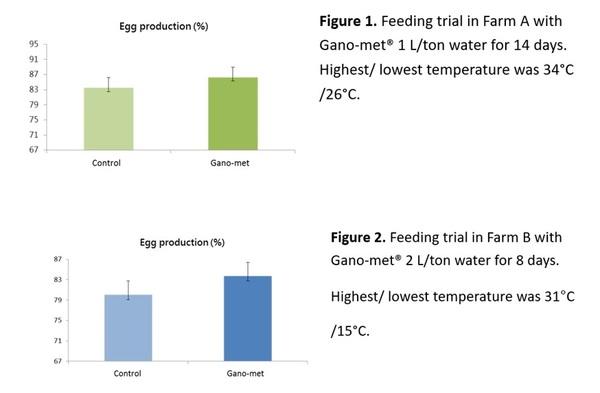
Content sponsored by:
Life Rainbow
Effect of Gano-met® on egg production in laying hens during hot season
Published: July 28, 2021
By: Life Rainbow Biotech
The issue of antibiotics resistance on animals has raised concerns about meat safety and human health. The banning of antibiotics- growth promoter in animal feed was announced in the EU in 2006. Other countries are starting to follow the regulation to comply with the compulsory withdrawal periods to ensure ‘antibiotics free products. Supplementation in nutrients to enhance the immunity system and lower the risk of the pathogen can help to reach the balance between maintaining animal health and productivity.
Life Rainbow Biotech has developed a liquid type nutrition supplement – Gano-met® for layer to exceed the unwell state and provide essential nutrition instantly. Gano-met® is a liquid supplement containing Ganoderma lucidum extract that can be applied to drinking water for poultry. Rich in active compounds such as required amino acids, polysaccharides, and triterpenoids, which own health-promoting effects.
Several stressors like laying eggs daily, rapid-growing in a short period, and environmental factors have a detrimental impact on poultry performance. The objectives of these trials are to evaluate the egg production rate after administrating with Gano-met® in laying hens.
Materials and Method
A. A total of 5,000 birds of 53-week-old hens (Hy-Line Commercial layers) were conducted in this trial that was housed in cages. A commercial laying hen diet was offered ad libitum. The hens were randomly assigned to one of 2 treatments, (1) the control group and (2) Gano-met® group (1L/ton water). During the experiment, the hens had free access to feed and water. Administration of Gano-met® was done through a drinking water system.
B. Another trial of 6,000 58-wk aged birds (Hy-Line Brown Commercial layers) was also conducted in the same way. The experiment was simply divided into two treatments: (1) control group, and (2) in-feed supplementation with Gano-met® (2L/ton water). Egg production rate of both trials were recorded. The highest temperature of two farms during experimental period was 34°C and 31°C respectively. The mean of egg production during the entire experimental period was calculated.
Results
In farm A, egg production was 86.3% of Gano-met® compared to control group (83.5%). Similar results were also observed in farm B that egg production (%) of hens treated with Gano-met® (83.7%) was higher than control group (80.1%).

Conclusion
The stressful source in poultry may be caused by temperature differences and transportation, which lead to deleterious consequences such as worse growth performance and productivity, more susceptibility to pathogens, and finally make an economic loss for producers coming after disease. Therefore, maintaining animal health during the period of antibiotics withdrawal is important. The trials exhibited that egg production were improved in two layer farms by administrating Gano-met® in hot weather, showed higher efficiency on egg production.
Related topics:
Recommend
Comment
Share
Sanluc International nv
30 de abril de 2023
It's not very clear how to read the both farm trials.
In the first trial, the product was used for 14 days in the drinking water and seemed to result in a increase egg production of 2,8% (in absolute terms). Is this increase related to those 14 days treatment, or over the whole cycle ?
Same question for the second trial : application of only 8 days resulted in 3,6% more eggs.
During these 8 days or during a longer time ?
Furthermore it would be important for correct interpretation to have full detail of the trial, since on farm trials, many conditions and parameters are so different, that it's always very difficult to isolate the real effect of one single intervention.
Recommend
Reply
Life Rainbow
2 de marzo de 2023
Dear Dr. SOGUNLE Olajide Mark
We have a lot of similar trials from our farm customers, but the temperature is around 34~35 degrees Celsius on average.
Recommend
Reply
2 de marzo de 2023
It's a wonderful trial. However, I wish to know if another trial of this sort was conducted in a tropical environment when the ambient temperature is between 35 to 37 degrees Centigrade?
Recommend
Reply

Would you like to discuss another topic? Create a new post to engage with experts in the community.


